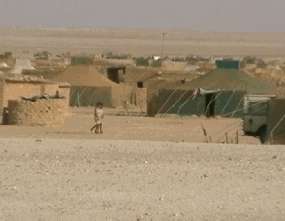A few weeks ago I sat on the floor of a tent in a refugee camp in the north-west African desert, having to admit to my Saharawi women hosts that only 21 per cent of our MPs in Australia are women. Women may have a more well-defined role in their Suni Muslim culture but they boast roughly equal representation of men and women in their parliament and councils.
These women were some of the 170,000 refugees from Western Sahara who fled their country when Morocco invaded in 1976, taking over two thirds of the land. Morocco’s interest was in the rich phosphate deposits and abundant fishing grounds.
The Saharawis have lived for more than 20 years in exile in camps of 40,000 people spread out across the border in Algeria in the harshest imaginable conditions. It never rains and summer temperatures are in the high forties, day after day.
Advertisement
The Saharawis are waiting for the United Nations to deliver on a referendum, promised back in 1991 as part of their peace agreement with Morocco. So far all attempts have been thwarted. The last date set was in July this year but Morocco insisted that all those who had been judged by a commission to be ineligible to vote should have right of appeal. These were largely ‘settlers’ sent into Western Sahara by Morocco in their hundreds of thousands. A right of appeal would mean a further three-to-five-year wait in the desert for the Saharawis.
The Saharawis are traditionally nomadic people. When Spain pulled out of the country in 1976, it had done little to prepare its Western Saharan colony for self government. The country had high levels of illiteracy and few administrative or professional skills.
After twenty years in exile the Saharawis, are ready for independence. Within their camps they have a democratically elected parliament, camp-based councils, women’s unions and ministries, including defence. It is the only refugee camp in the world to be run by the refugees themselves.
Their gender equality, it was explained to me, comes from a fierce determination to deploy all the skills available to survive in this place and to prepare for an orderly resumption of self-government. It is also true that in the early days of the camp, most of the men were engaged in war at the border and women, as they do, took on leadership.
They know education is crucial. All children go to primary school in the camps and are sent away for secondary and tertiary education in Europe and to Algiers. At the height of the impossibly hot summer, as many children as possible are sent off to board with families in other parts. So these are increasingly worldly, well-educated people.
Women are engaged in skill development at all ages. I visited workshops where knitting and sewing machines battle the all-pervasive dust to produce elaborate garments. In 48o heat, I marvelled at the woolly garments being made in preparation for winter.
Advertisement

It is hard to imagine living for two decades in tents with no running water, little fresh food, dust storms that last for days, relentless heat for months on end and cold winters.
Water is pumped from bores and trucked to small communal tanks each day. Those camps that have bore water grow vegetables, melons and date palms in community gardens – dusty oases in the red sand. These gardens have to be shifted every few years because the salts build up in the soil. Irrigation takes place along crude channels in the sand.
Women tend goats and camels, holding them in makeshift enclosures at night. They make structures out of mud bricks and wash them with terracotta, yellow and white render.
On average 14 or 15 people sleep in each UN-supplied tent. But there is no squalor in this orderly place and these women are not looking for our pity. Their frustration comes from the fact that the world has largely forgotten its promise to them.
Hostilities in this lop-sided war stopped in the interests of a peaceful outcome but with no referendum in sight the resumption of the war is likely. Any decision to resume fighting will be made by the Parliament, not the military, the Prime Minister hastened to assure me.
The Saharawis were keen to tell me two things they know about Australia. Firstly, that we played a key role in helping East Timor achieve independence and, secondly, we have some of the finest herds of camel in the world and, extraordinarily, do not use them!
Australia could play a role in determining Western Sahara’s sovereignty. It could give the political arm of the Saharawis diplomatic status in Australia, as 76 other countries have done. It could also put pressure on the UN, Morocco and France to see that a fair referendum is held quickly.
Australia should also extend a hand of friendship in a cultural exchange which could include taking some Saharawi students into our schools and universities. They also need better irrigation equipment, blankets, water tanks, refrigerators and medical supplies. Perhaps we should send them our camels too.